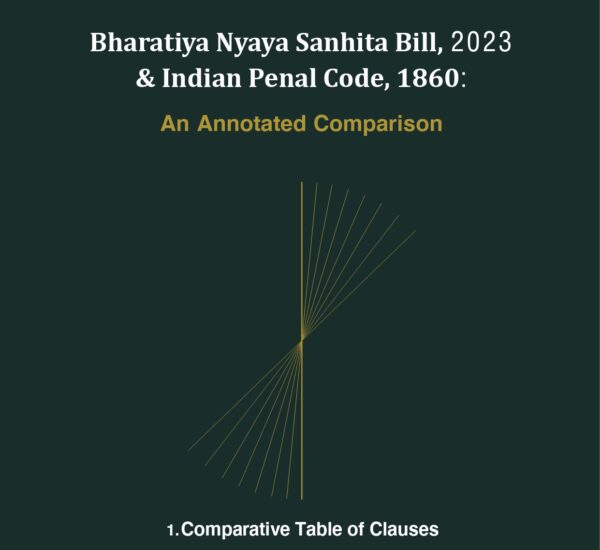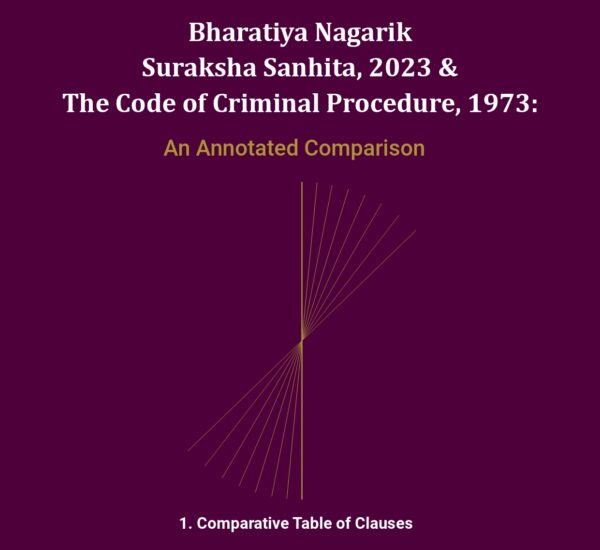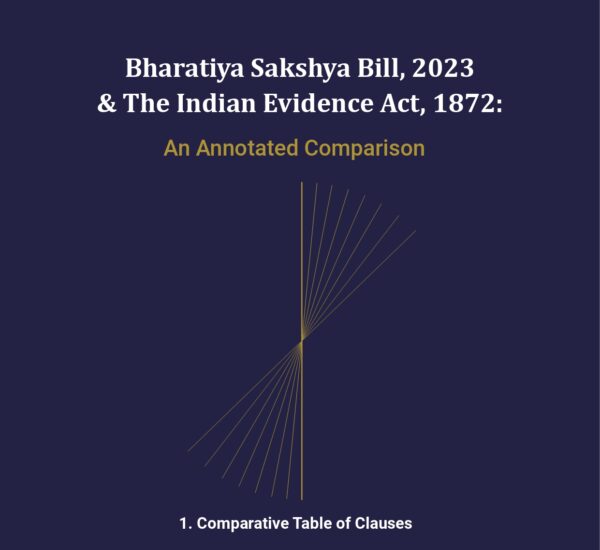
Aditi Nirajan
What is the ‘Aparajita Women and Child Bill’?
The Aparajita Woman and Child Bill (West Bengal Criminal Laws Amendment) Bill 2024 (‘Bill’) was introduced to enforce stricter punishments against rape amidst public outrage over the rape and murder of a doctor in Kolkata. To effect these punishments, the Bill amends provisions of the Bharatiya Nyaya Sanhita, 2023 (‘BNS’), the Bharatiya Nyaya Suraksha Sanhita, 2023 (‘BNSS’), and the Protection of Children Against Sexual Offences Act, 2012 (‘POCSO’) in the state. This piece aims to explain the changes to punishments made by the Bill, and provide perspective on the legal context behind some of them.
Changes brought about by the Bill
The most noteworthy changes in the Bill are the amendments to punishments for rape and acid attack, and the increase in the sentence range for these offences. For the purposes of this explainer, we will focus on the sentence of death penalty which has been incorporated as an apparent deterrent under this Bill.
First, the offence of rape is punishable with life imprisonment for the remainder of natural life or with death. Second, the Bill makes penetrative and aggravated penetrative sexual assault against minors punishable with life for the remainder of natural life or with death. The POCSO as it stands punishes penetrative sexual assault with ten years to life imprisonment and aggravated assault with twenty years to life imprisonment. Through these changes, an offence that does not involve murder has been made punishable with death. Third, the Bill provides for a mandatory death sentence in cases of rape where the victim dies or is left in a permanent vegetative state. Under current law, the aforementioned case of rape are punishable with a minimum of twenty years of imprisonment and a maximum sentence of death. The Bill has now been referred to the President, who will decide whether to give her assent and allow the Bill to come into force.
Concerns and implications of the mandatory death sentence
By introducing a mandatory death sentence, the Bill removes judicial discretion in sentencing for certain cases of rape. If the accused is found guilty, the court is statutorily bound to impose the death sentence, without the option of considering alternative punishments. The Bill’s provision for a mandatory death penalty has drawn criticism.
This change raises significant constitutional concerns. The Supreme Court in Mithu v. State of Punjab (1983)had declared the mandatory death sentence unconstitutional on two grounds: it violates Article 14 (due to its classification of murder by life convicts) and Article 21 (which fails to become a ‘procedure established by law’, given that it removes discretion in imposing the death penalty). The ruling emphasized that a mandatory sentence disregards the unique circumstances of each case, making it ‘harsh, unjust, and unfair.’ Justice Y.V. Chandrachud noted that the mandatory death-sentence “deprives courts of their discretion and compels them to impose a pre-ordained death sentence, ignoring mitigating circumstances.”
Mandatory death sentences also contradict the principles laid out by a Constitution Bench of the Supreme Court in Bachan Singh v. State of Punjab. The judgment laid guidelines to analyse both aggravating and mitigating circumstances, and the probability of the accused’s reformation to assess whether life imprisonment could be ‘unquestionably foreclosed’. Following this, the Court’s decisions in Santosh Bariyar v. State of Maharashtra and Rajesh Kumar v. State of Delhi framed the Bachan Singh guidelines as a two step process, requiring an assessment of aggravation and mitigation in the first step, and the improbability of reformation in the second step before life imprisonment could be unquestionably foreclosed. The onus to demonstrate the improbability of the accused’s reformation was held to lie on the State. To give teeth to these guidelines, the Supreme Court in Manoj v. State of Madhya Pradesh laid down guidelines directing trial courts to elicit reports about the offender’s jail conduct, mental health and adverse life circumstances. Manoj also directed the State to produce jail conduct reports.
Having a uniform and compulsory death sentence takes this individualised character and sentencing discretion away from the judicial process. Bachan Singh’s emphasis on proportionality and reformation is in direct conflict with the mandatory death penalty. Despite these decisions, the legislature has continued prescribing mandatory death penalty for certain crimes, including terrorism and drug trafficking (seeNDPS Act, 1985; SC/ST Act, 1989; TADA, 1987; UAPA, 2004). Courts, however, have maintained that mandatory death penalties under such laws are ultra vires and violate Part III of the Constitution (see Indian Harm Reduction Network v. UOI ; State of Punjab v. Dalbir Singh).
International law and the mandatory death sentence
The mandatory death sentence has been regarded as a violation of Article 6(1) of the ICCPR, which permits imposing the death penalty under restrictive conditions. The UN Human Rights Committee has found that a mandatory death sentence does not comply with the requirements of Article 6.
Multiple constitutional and international courts too have arrived at similar findings. The Privy Council declared the mandatory death-penalty unconstitutional in much of the Commonwealth Caribbean. Following this, courts such as the Constitutional Court of Malawi, the Supreme Court of Uganda, and the Court of Appeal of Kenya also upheld discretionary death-penalty systems underscoring that “a uniform sentence denies courts the chance of considering mitigating circumstances”, fail to consider circumstances of an individual offender and offence, and undermine the notion of proportionality in punishment. Notably, Uganda in Susan Karulaand Malawi’s Resentencing Project introduced systems for presenting mitigating evidence in all death-row cases. Similarly, the United States Supreme Court in Woodson v. North Carolina ruled that mandatory death sentences violate the Eighth Amendment. Justice Stewart noted that such sentencing treats convicts “not as individuals, but as members of a faceless, undifferentiated mass.”
Adding to this global trend, Malaysia abolished the mandatory death penalty in 2023, recognizing that it arbitrarily ignores the existence of the inherent right to life of every individual. Mandatory death sentencing is, as such, increasingly seen asagainst the norm of international law.
Political discussion and context
Concerns over harsher sexual violence legislation, driven by public outrage, are not new. In the past, India has enacted multiple amendments to criminal law, enhancing harsher punishments in response to sensationalized incidents of sexual violence. Key examples include the Criminal Law (Amendment) Act 2013 (after a gang rape and murder in December 2012) which redefined rape under the IPC and made punishments harsher, including death for repeat offenders. Similarly, a rape and murder in Kathua in 2018 led to the Criminal Law (Amendment) Bill, 2018, introducing the death sentence for raping girls under 12.
These concerns have also been echoed by the Justice J. S. Verma Committee as well, which did not support the death penalty for rape. The committee observed that “seeking the death penalty would be a regressive step” and instead emphasized reforms to police accountability, judicial processes, and survivor support systems. Academic scholarship has pointed out that the removal of judicial discretion for an offence results in a fall in conviction rate, linking mandatory minimum punishments to higher acquittal rates. (see, hereand here, for reasons behind this causal link)
Conclusion: Taking steps backwards
The Aparajita Bill introduces the mandatory death penalty and expedites timelines for investigation. Yet, its constitutional validity and implications for the criminal justice system raise significant concerns. Precedents, such as Mithu and Bachan Singh, underscore the need for judicial discretion at sentencing, emphasising proportionality and reformation over blind uniformity. Despite clear constitutionality problems, the tendency of the legislature to resort to harsh punishment regimes in rape speaks to a lack of concern or imagination in addressing sexual violence more effectively.
Aditi Nirajan is a Year III student at National Law University, Delhi.
Image credits: Frida Kahlo (Roots)
The opinions expressed in the Blog are personal to the authors. The University does not subscribe to the views expressed in the article/blog and does not take any responsibility for the same.





